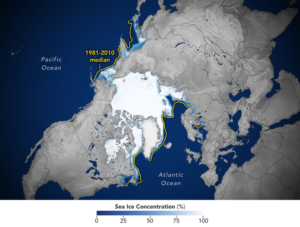2022 Arctic winter sea ice was 10th-lowest on record
Hitting its annual maximum extent late-February, experts have revealed ominous data about the state of the North Pole’s yearly freeze.
Every year, from autumn to early March, Arctic seas drop in temperature as colder months arrive, and areas where ice covers at least 15% of the ocean are used to calculate the overall extent of cover, with records maintained by NASA’s National Snow and Ice Data Center.

For 2022, the annual maximum extent was reached on 25th February, and peaked at 5.75m square miles. The 10th lowest level on record, it’s around 297,000 square miles smaller than the yearly average between 1981 and 2010. That’s equivalent to an area larger than the US states of Texas – the country’s second largest – and Maine, combined.
Satellites used to track this began reliably operating in 1979, and experts say a 13% decline has been evident overall each decade since. When it comes to maximum extents, the drop has been smaller, but still pronounced, at 2.7% every ten years. Calculations rely on sensors gathering data on ice distribution, which is then processed into daily images in a grid, each representing an area around 15miles by 15miles.
At the other side of the world, Antarctic sea ice behaves in a similar way, but at the opposite end of the calendar – extending between June and September, and then retreating as the southern hemisphere enters its summer. The latest winter data available for this shows a record-low minimum extent of ice cover, although there are some key differentiators to consider.
Firstly, Antarctic sea ice has greater fluctuations due to its geographical situation, with winds and ocean currents having a bigger impact. Ice is also surrounded by sea water, allowing it to spread more freely, whereas in the Arctic ice is hemmed by land masses, and therefore more restricted. Nevertheless, while Antarctic sea ice currently shows a trend of very small gains since records began, albeit that scale is almost flat, scientists point to the fact this does not offset the impact of the retreating Arctic winter sea ice.
In related news, warming arctic winters are now believed to be causing damage to ecosystems in subtropical Asia.
Image credit: Joshua Stevens/NASA Earth Observatory















